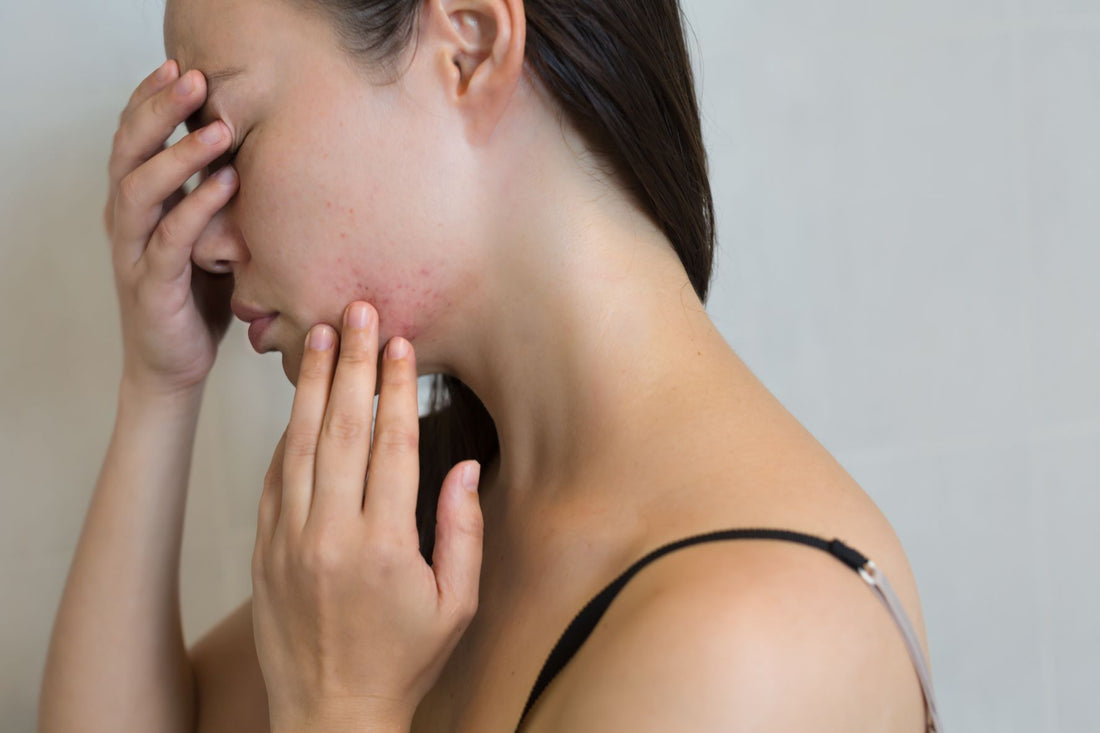
Skin & the psyche
‘In the early days of psychoanalysis, the skin was regarded as one vehicle by which the body and soul express the feelings and wellbeing of its barer. Itchy and inflamed skin was interpreted as a cry for attention and help and a sign of severe deprivation of tenderness and care…’*
Ever noticed that you get a spot just before a big date? Or that you blush when you stumble over your words during a presentation? When you think about it, it makes sense that your skin is a visual representation of what is going on within your body. But way more than just the mirror to your inner self, the skin’s two-way relationship with the brain and body has been brought into sharper focus of late. The term psychodermatology may have crossed your path recently, and we wouldn’t judge you if you rolled your eyes at what sounds like another made up skincare buzzword. However, we encourage you to bear with us nerdies, for Psychodermatology and its sister psychoendoneuroimmunology are more than just passing trends. The study of the relationship between the mind and the skin is changing the way we look at skin health and providing vital support to those experiencing mental distress due to a skin condition.
More than skin deep
Although it seems like a new buzzword, the concept of psychodermatology actually dates back to Hippocrates (460-377 BC) who was the first to suggest causality between emotional stress and skin disease, whilst reporting two cases of trichotillomania (the repetitive syndrome also called the ‘hair pulling disorder’)****** Despite the practice of psychodermatology remaining relatively niche today, awareness is growing, with almost a third of all the research mentioning the term in the National Institute of Medicine's Library of Health, being published in the last three years.
As a skincare brand and educator with a 360 approach to skin health, we welcome this holistic study of the skin, which encourages practitioners to consider the person as a whole. How we feel and think on the inside (whether we like it or not) often presents itself on the outside. And vice versa – how we look on the outside can influence how we feel inside. And science backs this up - research increasingly reveals that skin health is intrinsically linked to emotional well-being with one study revealing that 98% of skin disease patients say their condition affects their emotional wellbeing.*** With this huge statistic in mind, it is great news that its now becoming more accepted that what is going on with the skin can have an emotional, behavioural or psychosomatic aspect.

Call it skintution
Masters in non-verbal communication, the skin and brain are said to continually interact through psychoneuroimmunoendocrine mechanisms and behaviours that affect the initiation or flaring of skin disorders.****
The skin is our body’s largest organ, but the significance of skin on our inner lives is often overlooked. The skin is acknowledged as a protector against environmental aggressors but is less appreciated for the emotion it can incite. Referred to as a medium for psychosomatic expression, ‘skin to skin’ contact encouraged when a newborn baby is placed on its mother at birth. The soothing effect can encourage a restless infant to become calm and it is through this contact, through the comfort of holding and being held that sensations of smell, touch, taste, and warmth are transmitted between the two.******** This nurturing communication can signal warmth and love, yet how we feel about our skin throughout our lives can also lead to negative feelings embarrassment, fear or even shame. Physically, the mind is linked to the skin through the sensory nerves. These nerves release neuropeptides (including cortisol) into the skin that influence how the skin behaves in times of both disease and health. For example, long-term increases in cortisol can cause inflammation, leading to aging and acne. This can then become a vicious cycle as stress can worsen some skin symptoms, but skin symptoms can also raise a person's stress levels.
The skin condition psoriasis is an example of how your immune system, central nervous system, mental health, and stress levels are intertwined. Psoriasis causes the skin cells to grow too quickly. Whilst usually your body would shed these extra skin cells, with psoriasis, the extra cells build up on the skin’s surface and can cause pain and itching. The release of cytokines from the immune system is the reason for this overgrowth of skin cells and it has been found that stress can worsen or trigger psoriasis flares. Many people with psoriasis and chronic skin conditions report having depression and increased stress, particularly those with immunodermatoses such as atopic dermatitis and seborrheic eczema.***** Though many of these conditions are long term, Psychodermatology has the potential to provide support. The field can also aid those struggling with more common issues such as acne. Acne is now widely recognised for being accompanied by low self-esteem and social isolation, with acne sufferers reported to have a 63% higher risk of developing major depression within a year of diagnosis.*********
As well as skin conditions affecting the psyche, having a psychological disorder has also been seen to have an effect on the skin. The resulting stress that can accompany the disorder can then exacerbate any skin conditions, leading to more stress and a vicious circle. Skin conditions particularly influenced by stress include Inflammatory acne vulgaris; atopic dermatitis which typically flares with stress through psychoneuroimmune mechanisms and through scratching; lichen planus; pruritus and rosacea.***
What can a psychoderm do?
About 30% of patients who have skin disorders are reported to have concurrent psychiatric disorders and psychosocial impairments, while the overall prevalence of psychological disorders among patients with skin disease is about 25–30%. Psychodermatology may assist those suffering emotionally with a skin condition greatly by providing more support alongside traditional medical treatment if needed. And it appears the support is called for. The British Skin Foundation noted that around 26% of Brits are embarrassed by their disease and one third said that their skin condition affects their mental health and the lack of mental health support for skin disease patients was recently criticised in a UK Parliamentary report. The All Party Parliamentary Group on Skin revealed 98% of skin disease sufferers said their condition affects their emotional and psychological wellbeing. A worrying 5% of those surveyed reported suicidal thoughts. The survey further revealed that more than half the patients asked were unaware that specialist support was available for UK patients with skin conditions in the form of psychodermatology and only 18% had received some form of psychological support.
Addressing the area where skin conditions and mental health overlap, a psychodermatologist can empower those with chronic or long-term skin issues and recommend therapy such as Cognitive Behavioural Therapy, hypnosis, and counselling as support alongside any necessary medication. For example, a person with eczema may be advised to try habit-reversal therapy to help break an itch-scratch cycle that has been causing distress.

The link between skin and the mind: The statistics
A survey by British Association of Dermatologists revealed:
17% of dermatology patients need psychological support to help them with the psychological distress secondary to a skin condition
14% of dermatology patients have a psychological condition that exacerbates their skin disease.
8% of dermatology patients present with worsening psychiatric problems due to concomitant skin disorders
3% of dermatology patients have a primary psychiatric disorder
85% of patients have indicated that the psychosocial aspects of their skin disease are a major component of their illness.
British Association of Dermatologists, 2011
For more help...
If you want to see a psychodermatologist, we suggest you contact your GP first, but you can also visit mentalhealthireland.ie for more information on managing your mental health.
Other useful contacts include:
Dr Alia Ahmed: thepsychodermatologist.com
Irish Skin Foundation: irishskin.ie
Sources
* Journal of Investigative Dermatology (2008), vol.128
**Practical Psychodermatology, edited by Anthony Bewley, et al., John Wiley & Sons, 2014.
***Reich A, Wójcik-Maciejewicz A, Slominski AT. Stress and the skin. G Ital Dermatol Venereol. 2010 Apr;145(2):213-9. PMID: 20467395.
*** One Size Does Not Fit All: Diversifying Immune Function in the Skin (Shruti Naik)
***** From the brain-skin connection: the neuroendocrine-immune misalliance of stress and itch (Petra Arck, Ralf Paus)
******Psychodermatology: Past, present and future, Journal of the American Academy of Dermatology, Volume 81, Issue 4, Supplement 1, 2019,
******* Psychoneuroimmunologic aspects of skin diseases (Liborija Lugović-Mihić et al)
******** Koblenzer, C. Psychodermatology of women, Clinics in Dermatology (1997)
*Stress and psychoneuroimmunologic factors in dermatology (Mauro Urpe et al)
*********The Psychological and social impact of skin diseases on people’s lives, All Party Parliamentary Group on Skin.
